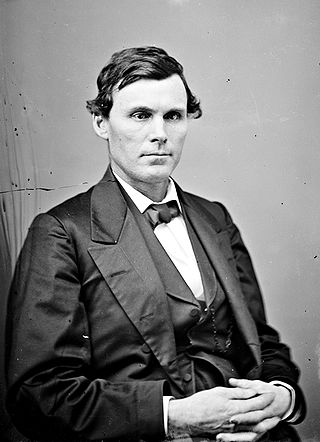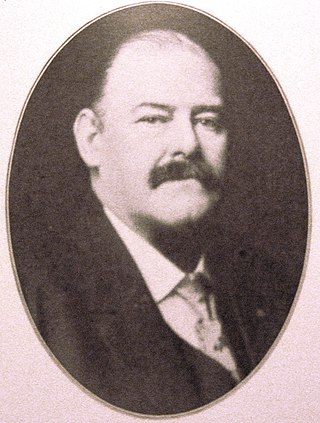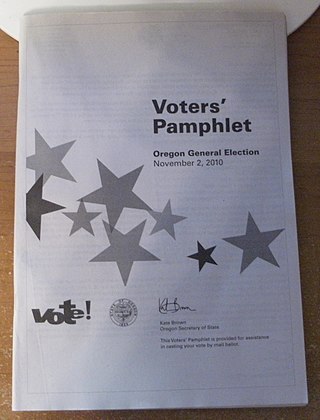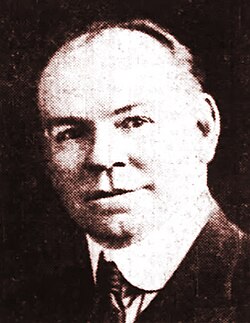
The Oregon Constitution is the governing document of the U.S. state of Oregon, originally enacted in 1857. As amended the current state constitution contains eighteen sections, beginning with a bill of rights. This contains most of the rights and privileges protected by the United States Bill of Rights and the main text of the United States Constitution. The remainder of the Oregon Constitution outlines the divisions of power within the state government, lists the times of elections, and defines the state boundaries and the capital as Salem.

Theodore Thurston Geer was the tenth Governor of Oregon, serving from January 9, 1899, to January 14, 1903. The Republican politician was in office when the legislature adopted the "Oregon System", Oregon's system of initiative and referendum. He also served in the Oregon House of Representatives, including time as its Speaker.

The Oregon Legislative Assembly is the state legislature for the U.S. state of Oregon. The Legislative Assembly is bicameral, consisting of an upper and lower house: the Senate, whose 30 members are elected to serve four-year terms; and the House of Representatives, with 60 members elected to two-year terms. There are no term limits for either house in the Legislative Assembly.

The seal of the State of Oregon is the official seal of the U.S. state of Oregon. It was designed by Harvey Gordon in 1857, two years before Oregon was admitted to the Union. The seal was preceded by the Salmon Seal of the Provisional Government and the Seal of the Oregon Territory. The state seal is mandated by Article VI of the Oregon Constitution.

The Oregon House of Representatives is the lower house of the Oregon Legislative Assembly. There are 60 members of the House, representing 60 districts across the state, each with a population of 65,000. The House meets in the west wing of the Oregon State Capitol in Salem.

Benjamin Franklin Harding was an American attorney and politician born in Pennsylvania. He held political offices in the Oregon Territory and later served as a United States senator from the state of Oregon.

The Oregon State Senate is the upper house of the statewide legislature for the US state of Oregon. Along with the lower chamber Oregon House of Representatives it makes up the Oregon Legislative Assembly. There are 30 members of the state Senate, representing 30 districts across the state, each with a population of 141,242. The state Senate meets in the east wing of the Oregon State Capitol in Salem.

Oregon's 2nd congressional district is the largest of Oregon's six districts, and is the seventh largest district in the nation. It is the second-largest congressional district in the nation that does not cover an entire state, and has been represented by Republican Cliff Bentz of Ontario since 2021.

The Andhra Pradesh Legislature is the state legislature of the Indian state of Andhra Pradesh. It follows a Westminster-derived parliamentary system and is composed of an

Oregon's Territorial Legislature was a bicameral legislative body created by the United States Congress in 1848 as the legislative branch of the government of the Oregon Territory. The upper chamber Council and lower chamber House of Representatives first met in July 1849; they served as the region's legislative body until Oregon became a state in February 1859, when they were replaced by the bicameral Oregon State Legislature.

William Nathan Barrett was an American politician and lawyer in Oregon. A native of Washington County, he served in both chambers of the Oregon Legislative Assembly, including three different times in the Oregon House. A Republican, he was also a three time mayor of Hillsboro, Oregon.

The following is an alphabetical list of articles related to the U.S. state of Oregon.
The following table indicates the party of elected officials in the U.S. state of Oregon:

The Seventy-Third Oregon Legislative Assembly was the Oregon Legislative Assembly (OLA)'s period from 2005 to 2006. There was a regular session in 2005, and a one-day special session on April 20, 2006.

The 75th Oregon Legislative Assembly convened beginning on January 12, 2009, for its biennial regular session. All of the 60 seats in the House of Representatives and half of the 30 seats in the State Senate were up for election in 2008; the general election for those seats took place on November 4.

The thirty-fifth Oregon Legislative Assembly convened in 1929 for its biennial regular session, starting January 14 and finishing March 4. Republicans controlled both chambers with overwhelming majorities. Only four Democrats, two in the House and two in the Senate, were members of the thirty-fifth Legislative Assembly. The body held no special sessions; no such sessions were held at all between 1921 and 1933.

The 2010 elections for the Oregon Legislative Assembly determined the composition of both houses for the 76th Oregon Legislative Assembly. The Republican and Democratic primary elections were on May 18, 2010, and the general election was held on November 2, 2010. Sixteen of the Oregon State Senate's thirty seats were up for election, as were all 60 seats of the Oregon House of Representatives.

Lesbian, gay, bisexual, and transgender, and queer (LGBTQ) people in the U.S. state of Oregon have the same legal rights as non-LGBTQ people. Oregon became one of the first U.S. jurisdictions to decriminalize sodomy in 1972, and same-sex marriage has been legal in the state since May 2014 when a federal judge declared the state's ban on such marriages unconstitutional. Previously, same-sex couples could only access domestic partnerships, which guaranteed most of the rights of marriage. Additionally, same-sex couples are allowed to jointly adopt, and discrimination based on sexual orientation and gender identity in the areas of employment, housing and public accommodations is outlawed in the state under the Oregon Equality Act, enacted in 2008. Conversion therapy on minors is also illegal.

The Government of Azad Kashmir is the state government which administers one of the territories of Pakistani-administered Kashmir territories of Azad Kashmir. The Azad Kashmir government consists of a president as head of state and a prime minister as chief executive, with the support of a council of ministers. The state assembly is the Azad Kashmir Legislative Assembly.















